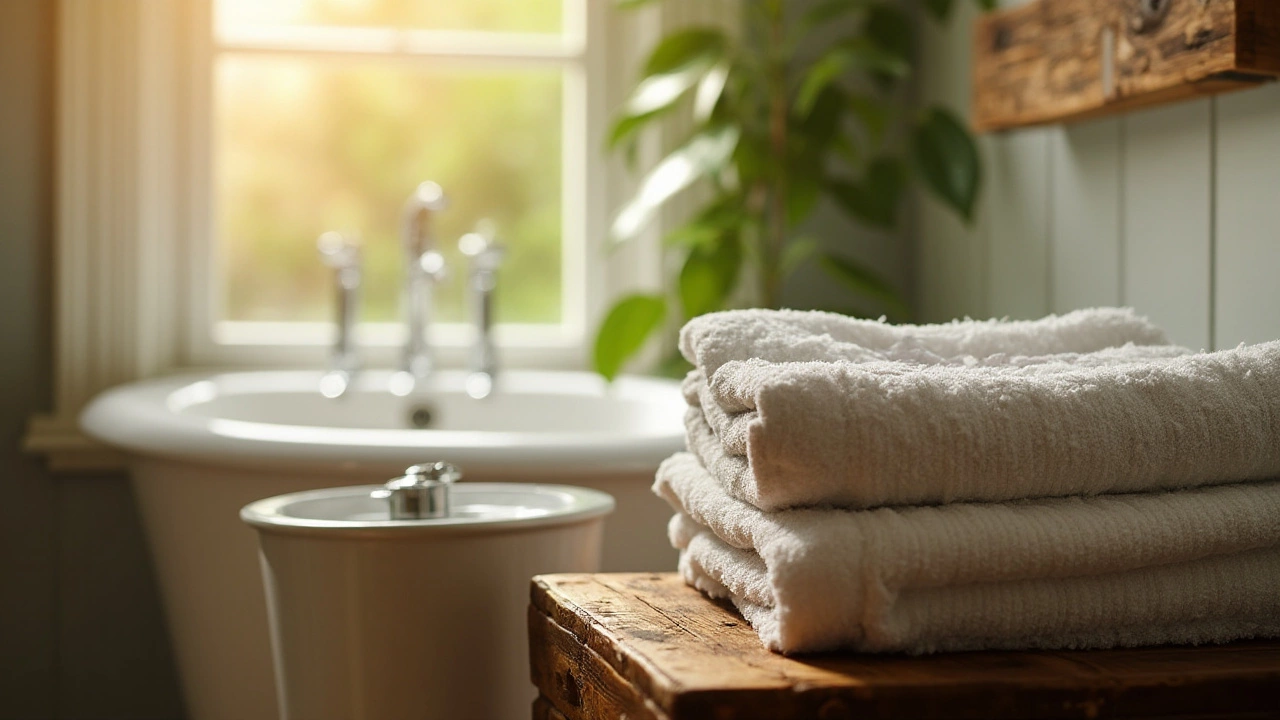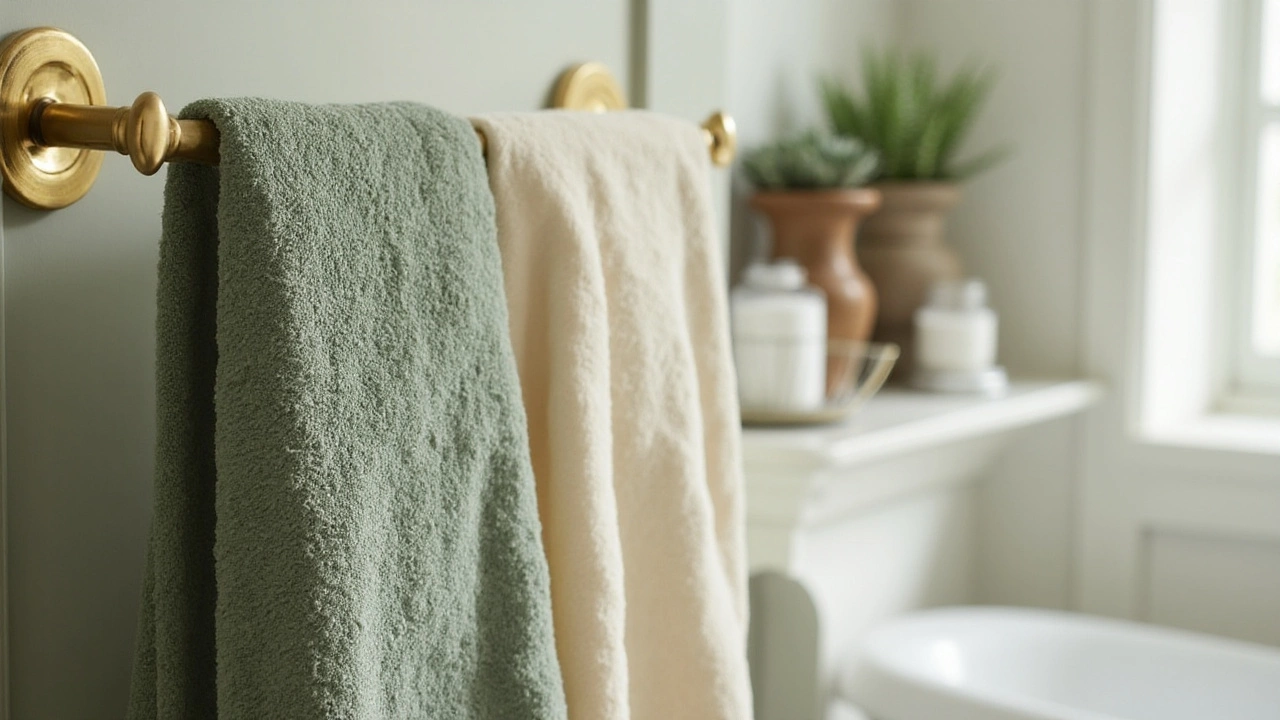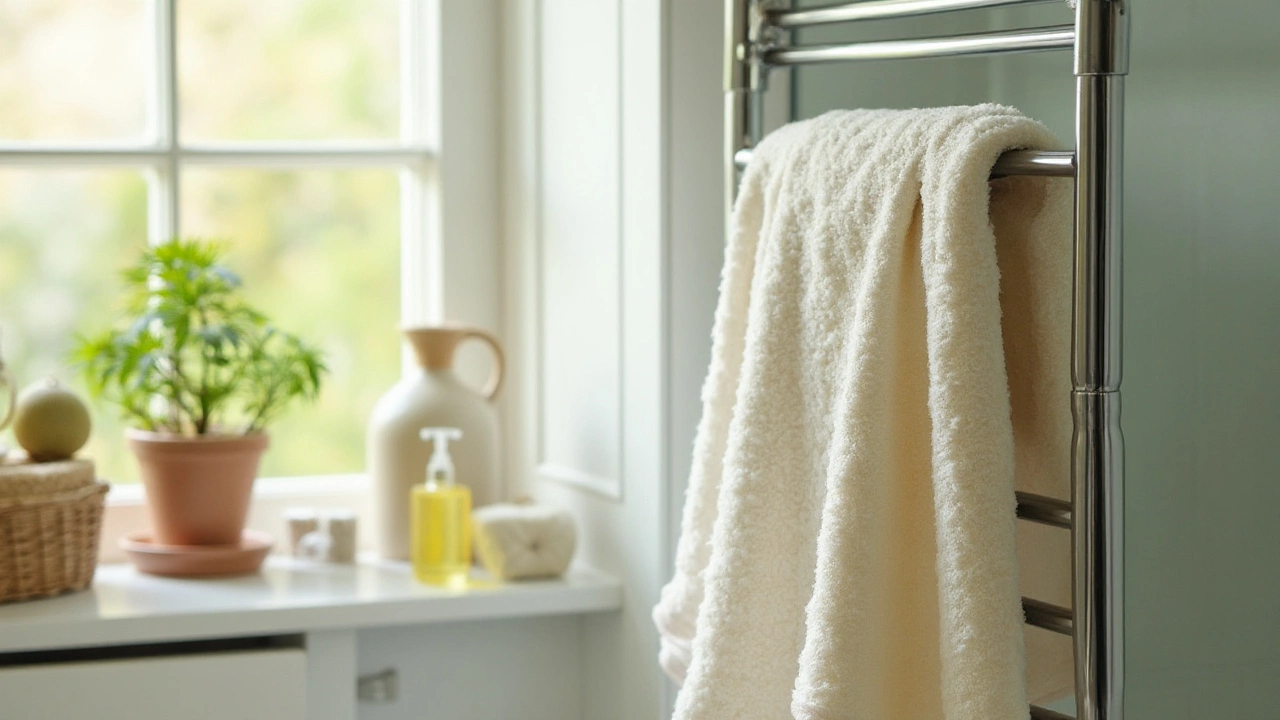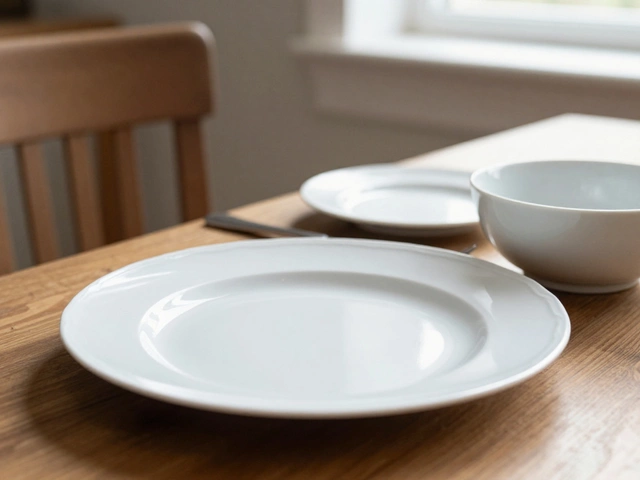Bath towels are more than just a bathroom necessity; they're our comfort blanket after a refreshing shower, wrapping us in warmth and coziness. But, ever wondered how often you should wash these soft companions? It's a question many of us ponder but rarely discuss. Everyone has different routines, and while some might stick to a strict washing schedule, others might wait until the towel looks—or smells—well-used.
Understanding the science behind towel care can help you maintain hygiene and extend your towels' lifespan. From the proliferation of bacteria to the simple pleasure of a fresh towel, there's more to this topic than meets the eye. Learn how to ensure your towels remain both a functional and luxurious part of your daily routine.
- The Importance of Regular Towel Washing
- Factors Affecting Washing Frequency
- Signs Your Towel Needs Washing
- Daily Habits for Keeping Towels Fresh
- Eco-friendly Washing Practices
- Proper Towel Storage
The Importance of Regular Towel Washing
Our trusty bath towels accompany us through our daily rituals, absorbing moisture and warmth in every use. Regular washing of these towels is more crucial than most might imagine. Bath towels have an unexpected guest list they host in their cozy fibers: bacteria and fungi. Each time you use a towel, it collects not just water, but dead skin cells, body oils, and, without cleaning, becomes a breeding ground for germs. This isn't just an abstract concept, but a real concern with tangible consequences, such as skin irritation or even infections.
Consider that damp, warm environments—like that of a recently used towel—are ideal spots for bacteria to multiply, ramping up their presence within just a few hours. According to a study from the University of Arizona, after merely three daily uses, towels can already harbor a frightening amount of bacterial activity. Such data captures the significance of maintaining a disciplined approach to washing your towels often. By washing them regularly—every three to four uses at a minimum—you greatly reduce your family's exposure to these unseen threats, making it an easy habit that provides peace of mind and better protection against minor skin conditions.
It's also about more than just preventing health issues. Regular towel washing contributes considerably to the overall comfort experience. Imagine stepping out of a soothing shower only to wrap yourself in a fragrant, fresh towel—a small but significant pleasure. This daily comfort is a simple luxury accessible through consistent towel cleaning, ensuring that every use feels like the first, with a pleasing scent and soft touch against your skin.
When we delve into the realm of towel care, we also enter the conversation of sustainability. Today's choices can also benefit tomorrow's world. By taking care of your towels, you ensure their longevity, minimizing waste and ultimately even reducing your ecological footprint. This isn't about choosing between luxury and responsibility but uniting them. Responsible towel care combines these elements, giving you a perfectly pleasurable routine and a cleaner conscience.
A helpful method to keep towels pristine is the habit of using and rotating several sets of towels. This ensures no towel is overused and gives each set ample time to dry thoroughly between use. Here’s an idea worth considering: utilize your love for design by choosing sets of different colors, which aids in remembering which towels have been rotated and makes it simple to stay on track. Through such practices, maintaining regular washing and usage becomes not just efficient but enjoyable, too.
A clean towel is a simple reminder of how small maintenance acts can provide significant comfort and health benefits in our daily lives.
In short, maintaining clean bath linens requires just a bit of commitment but repays in warmth, comfort, sustainability, and health security. These clean, fresh towels become your silent ally, enhancing your daily rituals and helping you care for both yourself and the planet.
Factors Affecting Washing Frequency
When it comes to tending to your bath towels, numerous factors can influence how often they need a good wash. A crucial element to consider is how frequently the towel is used. Unsurprisingly, a towel used every day will become a breeding ground for bacteria much faster than one used occasionally. The more often it's used, the more washing it requires. For families or houses with multiple users, this could imply a higher washing frequency compared to single-person households.
Climate and environment also play a part in deciding how often you should wash your towels. In humid regions, for instance, towels may not dry fully between uses. This moisture can encourage the growth of mold and bacteria, leading to unpleasant odors and potential skin irritations. Therefore, in such environments, washing towels more frequently becomes essential. Conversely, in arid regions where towels dry easily, you might be able to delay washing a tad longer.
Studies suggest that bath towels should be washed after every three to four uses to maintain hygiene and prevent bacteria build-up.
Personal hygiene practices impact how promptly you should wash your towels, too. If you are meticulous with personal hygiene and rinse well during a shower, your towel may remain fresh for a longer period. However, following outdoor activities or gym sessions, towels may collect more sweat, dirt, or oils, calling for immediate laundering to maintain hygiene. Children, with their constant escapades and exploration, might also require more frequent towel cleanings.
Another consideration is the type and quality of the towel material itself. Thicker, more absorbent towels might hold moisture longer, thus necessitating frequent washes compared to thinner alternatives. High-quality towels might endure frequent washes without losing their plush feel, while budget options might wear out quickly under the same routine, demanding replacements sooner than expected.
Sustainability concerns can further sway your towel washing regimen. With conscious living on the rise, many people prefer to limit washing to reduce water and energy use. In such cases, different methods of keeping towels fresh without immediate washing, such as airing them out or spot-cleaning, come into play. Nevertheless, balancing sustainability with cleanliness is crucial, ensuring that towels remain hygienic while possibly stretching out washing intervals.
In essence, finding the best towel washing schedule boils down to examining these variables and striking a balance that marries hygiene needs with personal circumstances. Keeping your bath towels in peak condition requires observing your unique habits, lifestyle, and the environmental factors at play, ensuring they remain fresh, pleasant, and long-lasting fixtures in your daily routine.

Signs Your Towel Needs Washing
You might think your bath towels are clean just because you only use them after a shower or bath, but truth be told, they can get grimy faster than you imagine. If you're wondering when it’s the right time to give your towels a good wash, there are a few telltale signs to keep an eye out for. One of the most obvious indicators is smell. A damp towel that wasn’t hung up properly will develop a musty, sour smell thanks to bacteria and mildew. If your towel starts to smell unpleasant even when dry, it's definitely time to toss it into the wash.
Another sign is the touch and feel of the towel. Over time, a fresh and soft towel can become rough and stiff. This change in texture is a result of dirt and mineral buildup, which can occur even if the towel looks clean to the naked eye. A simple touch test by rubbing the towel against your skin can help you notice this change. Perhaps you have sensitive skin or allergies? If yes, it's best to wash your towels more frequently as oils, grime, and dead skin cells increase irritants that can affect your skin.
If your towel is changing colors, this is another sign. Colors can fade, but if there are visible stains that don’t disappear after a good washing, it’s worth considering what caused them and ensuring your washing technique is optimized. Sometimes towels that hang in a steamy bathroom or are exposed to sunlight can start showing signs of discoloration due to bacterial presence or the bleaching effect of sunlight. Finally, after showering, if you find your towels aren’t absorbing water as efficiently, it indicates that washing is necessary. When towels lose their absorbency, it’s a clear sign they've collected too much residue from fabric softeners or detergent build-up.
“The stale smell on your towel is a good indicator that you need to wash it. Ideally, this should happen after three uses,” says an expert from the Good Housekeeping Institute.
Let’s not forget, personal hygiene plays a big role. If you are sick, finishing up a sweaty workout, or perhaps you have little ones who love making a splash in the tub, it’s worth giving your towels more frequent rinses to avoid spreading germs. Even if you don't usually share towels, guests or family members sometimes forget their own, leading to a communal towel experience, which is an invitation for bacteria transfer. In shared households, the simple lesson is to wash more frequently, making these observations key to knowing exactly when your trusty towels are due for some TLC.
Daily Habits for Keeping Towels Fresh
When it comes to maintaining that delightful fluffiness of a fresh towel, consistency is key. The way you care for your bath towels on a daily basis can make a world of difference. One simple habit you can cultivate is ensuring that your towels dry thoroughly between uses. Moist environments are a breeding ground for bacteria, so every time you finish using your towel, hang it up spread out so it can dry completely. A towel bar is often better than a hook because it allows more air circulation. Make sure your bathroom is well ventilated to keep humidity levels down, making it easier for towels to dry thoroughly.
Towel hygiene isn't just about washing; it's equally about drying. An excellent tip is to switch out your towel every three to four days if you're using it once daily. If you have a more active household, or if someone is ill, you might consider alternating towels more frequently. It’s amazing how much of a difference simply rotating towels can make, keeping your stock always smelling and feeling fresh. As my grandmother used to say, "A fresh towel is a small luxury within your reach every morning."
To keep your towels looking brand new, remember they like a little sunlight sometimes too. Once a month, hang your towels outside on a line to let the sun naturally brighten and freshen them. Sunlight is a natural disinfectant and helps kill off any lingering germs or bacteria. This old-fashioned practice has stood the test of time, proving its worth with generations who prized crisp, fresh fabrics. Just be cautious not to leave them out too long under strong sunlight to avoid fading.
Aside from drying techniques, how you handle towels matters. Avoid using fabric softeners in the wash, as they can leave residue that diminishes your towel's absorbency over time. Instead, give your towels a soak in vinegar every few weeks, which helps break down any build-up and keeps your bath towels in top absorbing condition. If you're looking to go a step further, try using white vinegar as a natural softener; it’s gentle yet effective and leaves your towels feeling fresh every time.
Another simple daily habit is to shake out your towels after using them and before hanging them up. This not only fluffs the fibers but also allows them to dry more thoroughly by releasing any trapped moisture. And let's not forget frequency: change your hand towels daily, especially in shared bathrooms, and washcloths should be switched out after two or three uses. This regular turnover keeps everything feeling clean and looking neat, and more importantly, it supports the hygiene of everyone in your household.
For those looking to track the freshness of their towels with a bit of data, consider keeping a simple log of towel usage and changes. You might be surprised to find patterns in usage that can help refine your towel care routine. Some households have found that logging towel use even helps reduce laundry frequency, highlighting more efficient ways to maintain towel freshness while conserving water and energy.

Eco-friendly Washing Practices
In our quest for cleanliness, it's important to consider not just how often we wash our bath towels, but also how we do it. Traditional washing methods can be heavy on water and electricity, impacting the environment. But, there are simple ways to make your towel care routine greener without compromising on hygiene. Let’s dive into a few practices that not only keep your towels fresh but also help in reducing the carbon footprint. Did you know that using cold water instead of hot can save a significant amount of energy? Many modern detergents are formulated to work effectively in lower temperatures, ensuring cleanliness without the added power consumption. By adjusting the temperature setting, you'll be doing both your utility bill and the planet a favor.
Choosing the right detergent is crucial. Opt for biodegradable and phosphate-free detergents, which are kinder to aquatic life and break down more easily in the environment. Look for labels like "Eco-friendly" or "Plant-based" the next time you're shopping. When it comes to keeping those bath towels soft, white vinegar is a natural fabric softener. Adding a half-cup to the rinse cycle can reduce the residue from detergents, leaving towels fluffy without the need for chemical softeners.
One often overlooked factor is the quantity of detergent used. It's a common misconception that more detergent equals cleaner towels, but in reality, less is more. Excess detergent can cause build-up, making towels stiff over time and requiring more water for rinsing. A properly measured amount, especially with high-efficiency detergents, ensures that your towels come out clean without leaving remnants behind.
There’s also a growing trend towards line-drying towels as opposed to using a dryer. A simple clothesline in your backyard or balcony lets nature do the drying, saving energy and adding a fresh, airy scent to your towels. If line drying isn’t possible, consider using dryer balls or even tennis balls in the dryer. They help separate towels for quicker drying and reduce the need for repeated cycles.
"Every little change we make to our daily routines can have a substantial impact in the grand scheme of environmental conservation," says Lori Von Hertzen, a known advocate for sustainable living.
Lastly, spacing out your wash days to just a couple of times a week contributes greatly to minimizing water waste. The key is adopting a mindful approach, balancing hygiene with our responsibility to protect natural resources. So, as you wrap yourself in a clean towel, know that it’s both your skin and the Earth you're nurturing.
Proper Towel Storage
Creating an ideal environment for storing your bath towels is essential not just for maintaining their appearance and fragrance but also for extending their lifespan. Your towels' proper storage can significantly impact their feel and smell by reducing moisture retention and bacterial growth. Start by selecting a cool and dry location, as hot and humid conditions spur mildew and bacteria, giving towels an unpleasant odor and harshness. Ensure your storage area has adequate ventilation to help air circulate freely, preventing mustiness.
Additionally, consider how towels are folded or hung. If you choose to stack them, ensure their edges are tidily aligned to promote even air distribution. Displaying them rolled in a bathroom basket can be visually appealing and functional for quick drying. Remember: never stuff them tightly, as air needs to circulate. Hanging is another practical option; use hooks or towel bars for maximum exposure to air. Loop or hang no more than two towels on a single rack space for efficient drying.
"Airing towels fully in between use can decrease bacteria significantly, prolonging their freshness," says Emma Jones, a notable expert in home resources.
For active households or shared living spaces, implementing an organized rotation system can be beneficial. Designate separate spots for each family member, simplifying responsibility over towel care and reducing excess wear on any single piece. This system not only keeps the washing towels more evenly but also meets individual preferences for cushion and texture, which can vary between humans. Store newly washed towels at the bottom, encouraging even usage.
Beyond placement strategies, remember to wash bathroom accessories like towels in a manner that is mindful of both health and environmental sustainability. Clean towels by sunlight occasionally, as UV rays can act as natural disinfectants and refresh their color. If possible, avoid storing towels in small, closed cabinets; pending they dry effectively, their persistent dampness might cause odors to come back no matter how often you wash them. In short, proper towel storage doesn’t take a lot of effort but offers tremendous benefits, leaving you with clean, plush towels every time you need them!







